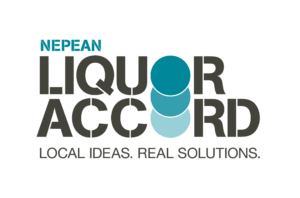About NLA

Nepean Liquor Accord is a partnership of local clubs, pubs, bars, restaurants, bottle shops, Nepean police command, Penrith City Council and OLGR that work together to reduce alcohol-related crime and anti-social behaviour.

Aims and Objectives
The aim of all Liquor Accords is to continually improve community safety with the assistance of Accord members to reduce alcohol related harm in their local area by:
Constitution
Local liquor accords are voluntary industry-based partnerships working in local communities to introduce practical solutions to liquor-related problems.
Download the Nepean Liquor Accord ConstitutionLegislation
This section covers Responsible Service of Alcohol (RSA), Responsible Conduct of Gambling (RCG) and Intoxication provisions. The provisions relating to these are extensive and should be fully understood.
The following summarises some of the provisions of the Act. For the complete provisions of the NSW Liquor Act relating to RSA, RCG and Intoxication, please download the legislation below.
RSA and RCG
Most staff members have an RSA and/or RCG competency card. For a small number of people who obtained their RSA certificate between 1 Jan 2010 – 21 August 2011, their RSA certificate will expire on 30th June 2016. As a result, any Licensee employing staff who gained their RSA qualification within this period must continue to maintain an RSA/RCG register until the 30th June, 2016.
The onus to produce their RSA certificates lies with the Licensee and as a result any Licensee who is unable to produce a certificate when requested by police or OLGR inspectors is liable for a penalty of $1100.
Whilst it will no longer be a requirement to keep an RSA or RCG register after the 30th June it is recommended that licensed premises continue this practice so they are able to keep track of their staff and assist police and OLGR inspectors when necessary.
Intoxication
- A noticeable change in behaviour – aggressive, bad tempered, using offence language, loud, boisterous, disorderly, physically violent, incoherence, slurring their speech, argumentative.
- A lack of judgement – careless with money, annoying other persons (including employees), drinking quickly, exhibiting inappropriate sexual behaviour.
- Loss of coordination – swaying, staggering, falling down, bumping into furniture or other people, spilling drinks, fumbling for items including money and cigarettes.
- Decreased alertness – drowsiness, dozing, rambling conversation, difficulty paying attention, lack of focus.
- Physical appearance – bloodshot/glassy eyes, smell of intoxicating liquor on their breath, untidy appearance including stained clothing.
Security
Security covers Security Staff and the Exclusion of Persons from Licenced Premises. These provisions are summaries only. For the complete provisions of the NSW Liquor Act, please download the following legislation.
Nepean Liquor Accord LegislationSecurity Staff
Security staff have the same common law powers as all citizens. This means they are able to detain a person they witness committing a crime until police arrive.
Security staff who fall under the definition of an employee are able to refuse entry to, or remove a person from a premises under certain circumstances. A security guard is only able to exercise a function authorised by their licence. Any abuse of their authority is seen as a serious offence and may result in the revocation of the holder’s licence.
A security guard must produce their licence when requested by Police or with any person they have dealings with when carrying on any security activity. Further, a security guard must clearly display on his or her person his or her licence when engaged in a security activity. The licence must be clearly visible. It must also be an original, not a photocopy or other copy. The penalty for either of these offences is $550.
Exclusion of Persons from Licenced Premises
The provisions of the NSW Liquor Act regarding the exclusion of persons from licenced premises are extensive.
Essentially, staff employed directly by a venue are able to refuse people entry to, or turn people out of the premises. In the case of a registered club an employee is a person engaged under a contract for services.
Persons authorised under the Act may exclude persons within the vicinity of the licenced premises. An authorised person is defined as “a licensee, an employee or agent of a licensee or a police officer.” The vicinity of the licensed premises means any place less than 50 metres from any point on the boundary of the premises.
Generally, persons who can be excluded from licenced premises include those:
- who at the time are intoxicated, violent, quarrelsome or disorderly, or
- whose presence renders the licensee liable to a penalty under this Act, or
- who smokes while on any part of the licensed premises that is a smoke-free area
- who uses, or has in his or her possession, any substance that the authorised person suspects of being a prohibited plant or a prohibited drug, or
- who the authorised person, under the conditions of the licence or according to a term of a liquor accord, is authorised or required to refuse access to the licensed premises.
Executive Committee
Chairman
David Want
Penrith RSL
Secretary
Alana Scott Mahjet
Panthers Leagues Club
Treasurer
Nathan Lowe
Kingswood Sports Club
- Jason Stone
- Scott Dickson
- Rowena Pulido
- Bill Owen
